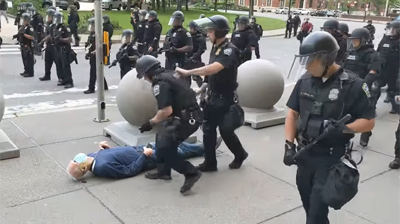

Ah okay, my bad. That makes sense, thanks


Ah okay, my bad. That makes sense, thanks


My thinking is growth rate lower than inflation rate is negative even though it’s not presented that way. Like the GDP growth is only in terms of price rather than actual volume because the total growth is less than “price” growth ie inflation.



Oooh that’s a recession (if it happens again next quarter) (that will be unacknowledged)


Thank you for leading this! I haven’t done a book club before… I thought this was really cool and having the weekly accountability helps too. And of course your notes will be a great resource to future readers. Great job @ChestRockwell@hexbear.net


Yep! I got a notification for this one


BTW I think you need to tag people in a comment… I didn’t get a notification from being tagged in the body of the post



We’re BAAAAACK!
The Hong Kong chapter was great. I was pretty ignorant of Hong Kong aside from knowing it was a former British colony. I think Bevins calling the “democratization measures” cronyism is accurate, but one thing he didn’t mention was the parallel to the British system. Since there isn’t a system of weird hereditary titles or whatever, setting up a “house of lords” kind of thing dominated by business is a great way to make sure your colony doesn’t get too far away from the status quo.
Out of curiosity I looked up the CIA World Factbook entries for Hong Kong in 1995 and the current version wondering if it might’ve been labelled more or less democratic either way. Even in this…uhhh…source… things seem a little more representative now than in the past. In the 1995 edition, 21+ could vote and their “electoral college and professional constituencies” amounted to about 100,000. In the current version suffrage is listed as 18+ and 220,000. It’s a superficial summary either way but I thought it was interesting to see the Fed take, although really the Factbook likely isn’t a great place to see the US trying to capitalize on unrest in other countries.


I have been sort of ruminating on individual action in response to this book about mass protest. One thing that’s been top of mind for me lately is “ethical consumption” and the thinking that if you buy or don’t buy something you’re making a difference, however small. A critique of this being that if you buy into ethical consumption and think you’ve done your part, that act of consumption is counterproductive because it’s stopping you from doing something more substantive. However I don’t think ethical consumption (particularly thinking of boycotts) is inherently bad, rather it’s “bad” because it’s ineffective (on it’s own without a political movement). Veganism is a sort of ethical consumption but I think has a kernel of prefiguration in that it’s an act of liberation from exploitation. At an individual level, I think veganism is still “good” because of this liberation. However, we come to the age old question of whether you can be a vegan without telling people about it. Is it enough to be a quiet vegan, or is this ethical consumption without further political action, which is ultimately ineffective? 
I think we’d have to conclude that results matter and perhaps movements can be too individualized to be effective. Movements based on horizontalism, radical consensus, prefiguration might be good in the sense they are liberating, but if they don’t get results, what’s the point? On the other hand, who is to say what we look back on in 30 years and point to as part of the next big thing, or who is growing up and becoming a leader in these groups.
All this to say, this is obviously a half-baked idea from me, but I wanted to put something out here and say that I’m really enjoying the book and I’m excited to see what we learn next.


I’ll just say that I really like Bevins’s turn to longer historical roots, especially since while I know the broad strokes of decolonization in Africa, I’ll admit I know jack about Tunisia, so this little primer was helpful.
I agree about Tunisia (and Bahrain, for me). I only knew the broad strokes of the how Tunisia started so it was a good primer. I didn’t know anything about Bahrain to his point that it didn’t really get coverage in Western media
82/83 - the refusal of the people/protestors/revolutionaries to “take anything” but retreat back to Tahir Sqare. Bungle? Or smart? Thoughts? Is this the legacy of Occupy, perhaps?
One thing that struck me is it seemed like Egyptians had a keen sense of how close they could get to “the line” without going over it. For instance this quote:
Someone asked, “What will we do after we reach Tahrir Square?” Everyone burst into laughter. That was not going to happen.
And this:
Protests had been staged in Tahrir Square, in the center of Cairo, for years. But they were never aimed at President Hosni Mubarak…at least not directly.
So in the context of the “Arab Spring” it sounded like they expected more repression than they got at the beginning. This might be a little off topic for the book, but I am really curious to learn more about the Mubarak - Egyptian Army - Muslim Brotherhood - US foreign aid dynamic in Mubarak getting replaced quickly by al-Sisi. I remember the MB was getting attention in the US and I’m guessing Uncle Sam had some demands related to that and the continued flow of funds into the country.
I have been waiting until I finish the reading to make comments but I think I’m going to start going chapter by chapter to engage a little more broadly with all the notes you are posting.


“A certain set of approaches were morally and tactically privileged from 2010 to 2020. To varying degrees you often heard that these were leaderless, ‘horizontally’ organized, ‘spontaneous,’ digitally collaborated mass protests in city streets of public squares. They took forms that were said to ‘prefigure’ the society they were meant to help bring about” (14) Are we still stuck in this paradigm? Or are we moving beyond it? Also, why is it so difficult to go outside, comrades?
Thinking back to the Arab Spring and Tahrir Square protests I remember a lot of discussion that it was enabled by social media, and indeed part of the state response to these movements was internet restrictions. I think in one sense this might contribute to the horizontal/spontaneous perception but really even in an online environment a hierarchy develops. Some people are more interesting and develop more of a following which I suppose could translate into some sort of leadership in terms of mobilizing protest.
I feel like Bevins is pointing toward the “New Left” moving away from the Leninist vanguard type structure as perhaps a contributing factor to these movements fizzling out. However that might be more of an observation on his part than part of his argument in the book. I think the SDS structure, and the observation of the 2010-2020 movements should also be considered in terms of historical state repression of leftist organizing. Being less hierarchical might make the organization more resilient. This might play a role alongside their motivation for prefiguration. Of course Lenin’s organizing was extremely repressed by the state as well so maybe I’m off on a rabbit trail here.
Fucking cops. Reminds me of this from 2020: